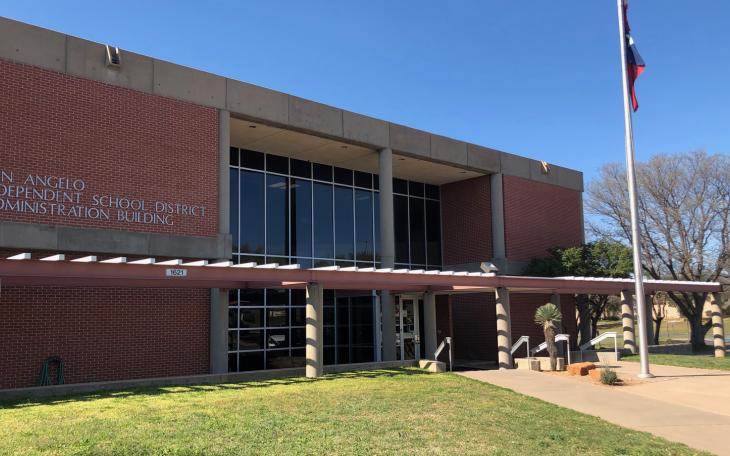GOODFELLOW AIR FORCE BASE, TX -- (Press Release) 2nd Lt. Daniel Hipps, 315th Training Squadron trainee, received the Purple Heart at the Base Theater on Goodfellow Air Force Base, Jan. 31.
“I was on my first of three deployments to Afghanistan as an [Explosive Ordnance Disposal] Airman,” said Hipps. “I was driving our armored vehicle to respond to an [Improvised Explosive Device] that the Marines had located on a patrol when the front left tire, right below my seat, triggered a pressure plate setting off an 80 pound explosion right under the truck.”
He compared it to the Hellfire missiles the U.S. uses that carry 20 pounds of explosives.
“Our truck was a mobility kill, but we were all ok, or so we thought,” said Hipps. “Our ears were bleeding and ringing, but we could walk away from the site, and in those days, that was a lot luckier than most. Since we were the only EOD team in that area we proceeded to prosecute the IED that we were called to by transiting in the [Marine Corps] trucks and on foot. Large parts of the 24 to 48 hours following the strike are lost from my memory. I had sustained a traumatic brain injury from the blast and the next few years were about to become a struggle to full recovery of my cognitive functions.”
Hipps' struggle was long.
“The first and greatest hurdle was getting treatment,” said Hipps. “I had seen to many of my coworkers either unwilling or unable to continue their EOD work get medically retired and I didn’t want to be in that scenario. I believed my mind would heal on its own. But it didn’t. I went back to Afghanistan and was exposed to many more detonations that, although smaller, still exceeded the threshold for what the [Department of Defense] considers a safe detonation. All these little detonations made it impossible to recover.
“That deployment was hard. We worked a deadly stretch of Route 1 and a lot of coalition forces died on our patrols. I came back home angry, frustrated, friendless and barely married. On top of all that, my mind was messed up. I would leave to go to the store and forget where I was going and just have to go home. Some days I couldn’t remember the cypher lock code to our building that I used every day and would have to call someone to be let in, I forgot the names of my family and so on. Through all this, constant back pain from whip-lash was driving me to drink a lot. I didn’t understand what was wrong with me, I had been one of the lucky ones, and I walked away while many whom I worked with were flown out on stretchers. These were dark times for me.
“Finally, my wife Katie, who was patiently there for me every day, took me to mental health. She sat with me the first time while the doctor explained my testing and treatment options. I underwent testing revealing significant loss of cognitive functioning and for two years I went to cognitive therapy.
“Somewhere in there I went back to Afghanistan for the 3rd time, I remember the therapist telling me, ‘don’t get blown up this time,’ we still did, but it wasn’t a bad one.”
Despite the challenges of his past, Hipps continued to improve himself.
“I’m not a religious person and for a long time I neglected my spiritual side, thinking that was just for religion,” said Hipps. “But I started doing things and activities that pulled me out of my day-to-day and put me in a better mental state. I started mountain and rock climbing, these activities brought me out into nature and really started to help me down a path of spiritual wellness. Socially, my friends and my wife are the reason I get up every day to go to work. Human interaction is what keeps me going.
“One of the hardest things to do was study for a degree throughout all this. Commissioning was in the back of my mind but I just wanted to be the best EOD tech I could be. As a Tech. Sgt., I went on a low risk deployment to Kuwait and just when I was starting to think maybe I could survive the rest of my EOD career without any more detonations, I was asked to go to on a high-risk mission into ISIS territory. Of course, I couldn’t say no for fear someone else would go and die. The mission was canceled but it was a sobering realization for me. If I get blown up again, all the work I’ve done will be undone and maybe worse. I’m too proud or scared to say no to a mission that might cause disaster, it was time for a career change.”
Hipps earned his commission and became an Intelligence Officer and encourages Airmen to better themselves.
“First, don’t be a victim,” said Hipps. “We live in a generation of victims, but as Airmen, we don’t have time to feel sorry for ourselves, and we owe it to our country to do what we were trained to do no matter the circumstances. When faced with hardship, know that it was your choices that brought you there, and only your choices that will carry you though.
“Second, take care of yourself and your wingmen. Airmen are committing suicide faster than ever before, and it’s on us to take hard looks at ourselves and those around us. The resources are there to recover from hard experiences, we owe it to ourselves and our wingmen to take care of ourselves. Take resiliency seriously, not just [the routine and required training] but the practices themselves, take those seriously.
“Without a doubt, everyone’s ability to cope with hardship will be tested and likely when you expect it least,” Hipps concluded.
Subscribe to the LIVE! Daily
Required






Post a comment to this article here: